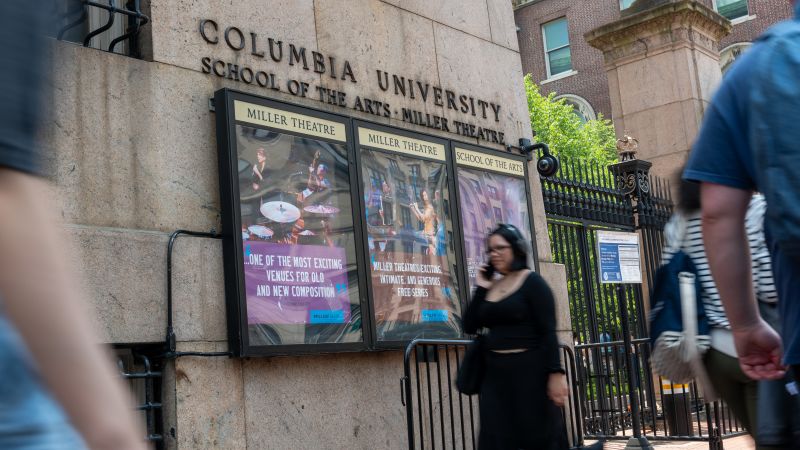House Republican Leadership Chairwoman Elise Stefanik has raised concerns about Columbia University’s acting president, Claire Shipman, over remarks that Stefanik argues could potentially violate the Civil Rights Act. The controversy centers on Shipman’s past comments regarding the inclusion of an Arab individual on the university’s board, amidst ongoing investigations into antisemitism on campus.
In a letter sent on Tuesday, Stefanik, alongside GOP Representative Tim Walberg, chair of the House Education and Workforce Committee, highlighted a message from January 17, 2024. In the message, Shipman, then chair of Columbia’s board of trustees, emphasized the need to appoint someone from the Middle East or of Arab descent to the board, stating, “Quickly I think. Somehow.” Stefanik and Walberg urged Shipman to clarify her statement, asserting, “Were Columbia to act on this suggestion and appoint someone to the board specifically because of their national origin, it would implicate Title VI concerns.”
Title VI and Allegations of Discrimination
Title VI of the Civil Rights Act prohibits discrimination based on race, color, or national origin in programs or activities receiving federal funding. The letter from Stefanik and Walberg also references Shipman’s criticism of Jewish board member Shoshana Shendelman, described as a vocal advocate against antisemitism on campus. Shipman reportedly commented on January 25, 2024, “I just don’t think she should be on the board.” The committee questioned Shipman’s motives, especially given the climate of fear and hostility faced by Jewish students at Columbia.
In response, a Columbia University spokesperson stated, “These communications were provided to the Committee in the fall of 2024 and reflect communications from more than a year ago. They are now being published out of context and reflect a particularly difficult moment in time for the University when leaders across Columbia were intensely focused on addressing significant challenges.”
Columbia’s Response to Antisemitism Allegations
The spokesperson further emphasized Columbia’s commitment to combating antisemitism, mentioning ongoing discussions with the Joint Task Force to Combat Antisemitism, initiated by the Trump administration. “Acting President Claire Shipman has been vocally and visibly committed to eradicating antisemitism on campus; the work underway at the university to create a safe and welcoming environment for all community members makes that plain,” the statement added.
The letter from Stefanik and Walberg also cited a message from October 30, 2023, following the October 7 Hamas attack, where Shipman expressed concerns about the rising antisemitism on campus. Shipman remarked, “People are really frustrated and scared about antisemitism on our campus and they feel somehow betrayed by it. Which is not necessarily a rational feeling but it’s deep and it is quite threatening.” Stefanik and Walberg found this description perplexing, given the reported violence and harassment against Jewish and Israeli students at Columbia.
Broader Context and Historical Parallels
This development follows a broader pattern of accusations against US universities for allegedly tolerating antisemitism. The Trump administration has accused several institutions, including Columbia, of failing to protect Jewish students adequately. In March, the administration withdrew $400 million in federal funding from Columbia due to campus protests, prompting the university to impose new restrictions on demonstrations and review its Middle East curriculum.
Last month, the US Department of Education’s Office for Civil Rights intensified its scrutiny of Columbia, declaring that the university does not meet accreditation standards because of its failure to safeguard Jewish students. This ongoing saga highlights the complex intersection of academic freedom, campus safety, and federal oversight in higher education.
Implications and Future Steps
The implications of these allegations are significant, as they could affect Columbia’s federal funding and its reputation as a leading academic institution. The university’s response to these challenges will be closely monitored by both federal authorities and the public. As Columbia continues to navigate these turbulent waters, the focus remains on ensuring a safe and inclusive environment for all students, while addressing the concerns raised by federal investigators and political leaders.
As this story unfolds, it will serve as a critical case study in the ongoing debate over how universities balance the protection of free speech with the need to provide a safe and nondiscriminatory environment for all students.
About The Author
 Ativion and NASEF Partner to Revolutionize Scholastic Esports in U.S. Schools
Ativion and NASEF Partner to Revolutionize Scholastic Esports in U.S. Schools Top Mobile Games by Player Count: Free Fire Leads the Pack
Top Mobile Games by Player Count: Free Fire Leads the Pack How a Simple Paper Test Can Prepare Your Fridge for a Heatwave
How a Simple Paper Test Can Prepare Your Fridge for a Heatwave Intel’s Strategic Chip Shift and India’s Startup Surge: A Tech Industry Overview
Intel’s Strategic Chip Shift and India’s Startup Surge: A Tech Industry Overview How to Safely Buy Ether with PayPal: A Comprehensive Guide
How to Safely Buy Ether with PayPal: A Comprehensive Guide